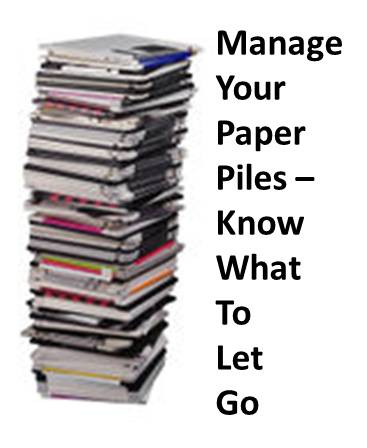Organize This! Managing Piles of Paper - What to Keep and What to Let Go
 Friday, February 11, 2011 at 7:00AM
Friday, February 11, 2011 at 7:00AM  MAD21
MAD21 By Stephanie Calahan (Calahan Solutions, Inc)
 Is paperwork taking over your life? Are you keeping every single bill, tax return, insurance invoice, medical documentation, contract and even the 15-year-old warranty for the water bed that you sold at the yard sale ten years ago? If you answered "yes," you are not alone. Many people are not sure how long financial records retention should last, especially tax records. Determining what to keep and what to toss is often a difficult decision for homeowners.
Is paperwork taking over your life? Are you keeping every single bill, tax return, insurance invoice, medical documentation, contract and even the 15-year-old warranty for the water bed that you sold at the yard sale ten years ago? If you answered "yes," you are not alone. Many people are not sure how long financial records retention should last, especially tax records. Determining what to keep and what to toss is often a difficult decision for homeowners.
Some documents and records need to be kept indefinitely but, many can be discarded after a prescribed period. Here are some general rules to follow on how long you should keep various records. Please note there are personal instances where documentation is required to be kept longer than our guidelines suggest. Check with your financial or tax advisor if you have questions.
How Long Do I Keep It?
If you would like a handy guide to remind you of what to keep and what to let go, check out How Long Should You Keep Papers in Your Home - Ideas for 76 Kinds of Residential Paperwork. I created this special report to help me figure out how long I should keep various types of information and have found that my clients love it too.
To get you started, here are a few rules of thumb:
Tax Returns and Backup Documentation: Whether personal or business, the general rule is seven years. This may seem like a long time to hold onto these papers, but think of it as an annual cleaning out as new returns are filed. One in … one out and the old adage of "better safe than sorry" will apply. The IRS has three years to audit you from the date you file your taxes; however, they have seven years to clear up and correct so called "Discrepancies."
Yes, the IRS keeps copies of your returns, but it is up to you, in the event of an audit or any other types of questions, to have on hand all of the backup information that went into the preparation of your returns. This is where a scanner may come in handy, as you could easily scan your backup information and that would cut down on the paper piles.
Warranty Documents: Remember that old water bed? Well, keep in mind that anytime you get rid of an appliance, telephone, or anything else that had warranty documentation, you can safely "toss" the papers at the same time! The general guideline is to dispose of a warranty at the date of expiration. Want to be even more adventurous? Take a look at these posts for ideas on getting rid of even more:
Home Repair Bills & Contracts: This is another great area where a scanner might save you some significant file room. You should keep these kinds of records for about ten years in case you need to prove something with regard to guarantees of workmanship, or if you have any inkling of potential litigation at some future date.
Pay Stubs: Is anyone really going to ask for proof that you worked at the Dairy Queen during Junior High? Highly unlikely! Keep the year-long worth of stubs until you reach the year-end check of December 31st that recaps the entire 12-months-worth of pay, social security, taxes, etc. Then get rid of those other "51" or "22" or "24" statements. In addition, Social Security Administration has all of your employment history on file.
ATM Receipts: This is a very individual and personal thing. Tons of people have glove compartments and wallets brimming with ATM slips from four years ago. My husband is one of them! A suggestion might be when you do an ATM transaction to immediately enter it into your check book listing and then toss the receipt.
Utility Bills: If you are writing off your utility bills for tax purposes, you may need to keep them as tax records. However, if you can't write them off, you can keep a minimal amount of bills (last 3 months). The utility companies can recreate the others for you if you need them. Three months allows you to establish residency for purposes of driver's licenses, voter registration, mortgage application, etc.
Mortgage Documents: The good news is that the most important documents are probably recorded in your county records. For example, if you use a commercial bank for your financing then they will record a mortgage on the property when you take out the loan. After you've paid off the mortgage they are obligated to record a satisfaction of mortgage.
If you look at that document, you should see some recording marks along the side indicating the book and page in which it was recorded in the county records. To be safe, however, hold onto that document for 10 years. Whenever someone thinks you owe them money, you'll want to hold on to proof of payment for longer than you would if the reverse was true. The burden of proof is going to be on a lender to prove you owe money. If you've paid it off, you'll want to prove that you did. This can be done with the satisfaction of mortgage or with bank statements and cancelled checks that your bank has on microfilm. However, if this information is readily available from the bank or county records, you don't need to worry too much.
If you are doing renovations, make sure you get the satisfaction of lien from the contractors doing the work. Keep that as long as you own the property. When you sell it, the lawyers will do a title search and the title insurance should take over after that.
So, records retention, when in doubt, go with the ten-year rule of thumb and you should be just fine. Also, consider purchasing, and using a paper shredder, as well as a scanner, these two items could save you time and hassles.
To your success!
 Stephanie is the founder and CEO of Calahan Solutions, Inc. She is a nationally known speaker, media personality, author, publisher, productivity & organization consultant, and business coach. She believes that organizing is about making time and room for what is important to you and that life was meant to be lived. Stephanie lives in Illinois with her husband, 9-year-old son and Havanese puppy. You can find her on Twitter and at Productive and Organized, Daily Productivity Tips, and at Stephanie Calahan.
Stephanie is the founder and CEO of Calahan Solutions, Inc. She is a nationally known speaker, media personality, author, publisher, productivity & organization consultant, and business coach. She believes that organizing is about making time and room for what is important to you and that life was meant to be lived. Stephanie lives in Illinois with her husband, 9-year-old son and Havanese puppy. You can find her on Twitter and at Productive and Organized, Daily Productivity Tips, and at Stephanie Calahan.
 Family Management,
Family Management,  Filing,
Filing,  Office,
Office,  Organization,
Organization,  Papers in
Papers in  Organize This!
Organize This! 




Reader Comments